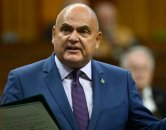Source Feed: National Post
Author: stuck@postmedia.com
Publication Date: April 16, 2025 - 04:00
Trump tariffs no match for 'gravitational pull' of U.S. market
April 16, 2025
OTTAWA — No matter where Donald Trump’s ever-changing tariff plans land in the coming days, economists and other trade specialists warn that Canada’s efforts to diversify from the United States market will be overwhelmed by the “gravitational pull” from our southern neighbour.
Trade officials say the Canadian and American economies — for better or worse — are tied at the hip and that’s not going to change no matter what Canada does to diversify its exports.
Trade diversification has been a Canadian government priority for decades and a frequent refrain on the current federal election campaign trail. The notion of diversification, a trade priority since before Confederation, has achieved near-infallible status in recent weeks as candidates look for responses to the Trump tariff threats.
But those most familiar with trade patterns say the campaign chatter, especially any talk about joining the European Union (EU), is not to be taken too seriously.
“It’s completely a pipe dream,” said Brian Lee Crowley, a political economist and managing director of the Macdonald-Laurier Institute, an Ottawa-based think tank.
Canada and the U.S. are blessed to share a lucrative “continental economy,” he says. “We make things together.”
There’s no down side to trade diversification, the economists say, in that more customers and increased sales are always good. But market and geographic realities suggest that the U.S. will easily remain Canada’s leading buyer for the forseeable future. The Canadian and American economies and their companies’ countless supply chains are tightly woven, a reality that may not be well understood by most politicians on either side of the border.
There are also other sturdy barriers to diversifying trade.
Benjamin Tal, the deputy chief economist of CIBC World Markets, said transportation costs soar once a North American company exports overseas. There can also be added linguistic, cultural and regulatory questions and additional costs and headaches associated with the need to open overseas sales offices.
Custom fees and transportation can add significant costs to exports, but it’s also difficult to quantify relationships and the element of trust, said Louise Gervais, a systems manager at Nickleson Machine & Tool in Windsor, Ont.
A company such as Nickleson, with about 25 employees, can’t always afford the risk of sending a large shipment of its tools for auto and aerospace parts manufacturing to an unknown customer on the other side of the world.
“It takes a while to build up that rapport,” she said.
Canada’s roster of free-trade agreements is not a barrier. Since signing the North American Free Trade Agreement (NAFTA) in 1993, Canada has moved aggressively by signing 15 deals, including with the EU, that cover 51 countries, including all members of the G7 economic club.
Governments have also invested billions in trade diversification, notably in infrastructure and services to support exporters and in helping Canadian businesses execute export strategies.
All of the deals and investment are designed to make exporting more fluid and lucrative for Canadian companies.
Yet it’s unclear how well they’re working, at least when it comes to trade diversification. CIBC says the percentage of Canadian exports headed to the U.S. market is now 76 per cent, the same as a decade ago, while American goods and services account for 50 per cent of Canadian imports, slightly less than a decade ago.
Trade specialists say that figure alone makes the point that international trade is dominated by economic factors — supply, demand and geographic proximity to markets in particular — more than political ones. Tariffs, for example, can have a direct effect on sales and profit margins, they say, but are unlikely to shift international trade trends as much as many observers might think.
Exports to both the U.S. and non-U.S. markets have been growing at a healthy clip in recent years, said Todd Winterhalt, the senior vice-president of international markets for Export Development Canada (EDC), a Crown corporation that helps Canadian businesses with foreign trade.
But Winterhalt agrees that the current tariff war makes this a particularly good time for Canada to invest in its trade infrastructure, particularly transportation and digital links, and pipelines.
Canada’s diversification problem is fixable but will require governments and others to put words into action, said Goldy Hyder, the chief executive officer of the Business Council of Canada, which represents many of Canada’s largest companies.
If Canada wants economic growth and jobs that come with increased trade, Hyder says, Canada needs to reduce the red tape that burdens business, slash approval times for projects, and build the pipelines, port facilities and other necessary infrastructure for exports.
Hyder adds that it’s not the Trump tariffs that worry him the most, it’s Canada’s own inaction.
Talk about trade diversification is again on the rise, as is often the case during two types of circumstances, both of which fit the current landscape: economic crises and election campaigns.
“It’s a unique moment in time,” says Winterhalt.
Economists agree that Canada is blessed by its geography: lots of land and resources and located on the doorstep of the world’s largest and arguably most dynamic economy. Those factors usually override diversification efforts, or even tariffs, creating a “gravitational pull” towards more trade with the U.S.
But Tal says the bigger picture trend in Canadian trade is in fact moving strongly away from diversification, despite the Trump tariff talk. The world has entered into what he calls “the economic Cold War,” a global trend that has not yet been fully appreciated by many politicians and others. The globe is being divided into two major trading blocs, he says, similar to the two large political and military blocs during the Cold War that started at the end of the Second World War.
These two new trade orbits are centred around the world’s two largest economies: the U.S. and China, and there’s no question that Canada is firmly entrenched in the U.S. camp, Tal says, and a decoupling is virtually impossible no matter what happens in this round of tariff wars.
All countries, like with the Cold War, will likely need to choose a side in this bipolar world. The decision, Tal says, is an obvious one for Canada.
“In Canada, we know where our lifeline to economic viability and security lies,” a recent CIBC trade report says.
Tal predicts in that report that the North American neighbours will settle their part of the tariff wars by renegotiating the Canada-United States-Mexico Agreement (CUSMA), the renegotiated NAFTA. A new deal, the report says, will likely lead to Canada committing to buy more American goods, probably as part of a vow to increase defence spending.
And that, the CIBC economist points out, will mean a greater Canadian reliance on trade with the U.S. — the exact opposite of diversification.
National Post
Get more deep-dive National Post political coverage and analysis in your inbox with the Political Hack newsletter, where Ottawa bureau chief Stuart Thomson and political analyst Tasha Kheiriddin get at what’s really going on behind the scenes on Parliament Hill every Wednesday and Friday, exclusively for subscribers. Sign up here
Our website is the place for the latest breaking news, exclusive scoops, longreads and provocative commentary. Please bookmark nationalpost.com and sign up for our daily newsletter, Posted, here.
A high-profile sexual assault trial involving five former members of Canada's world junior hockey team is set to begin in London, Ont., Tuesday.
April 22, 2025 - 04:00 | Aaron D’Andrea | Global News - Canada
A high-profile sexual assault trial involving five former members of Canada's world junior hockey team is set to begin in London, Ont., Tuesday.
April 22, 2025 - 04:00 | Aaron D’Andrea | Global News - Ottawa
Document suggests that Larry Brock, who has harried Liberals over alleged ethics violations, did not notify the ethics commissioner of his financial liabilities.
April 22, 2025 - 04:00 | David Akin | Global News - Canada



Comments
Be the first to comment